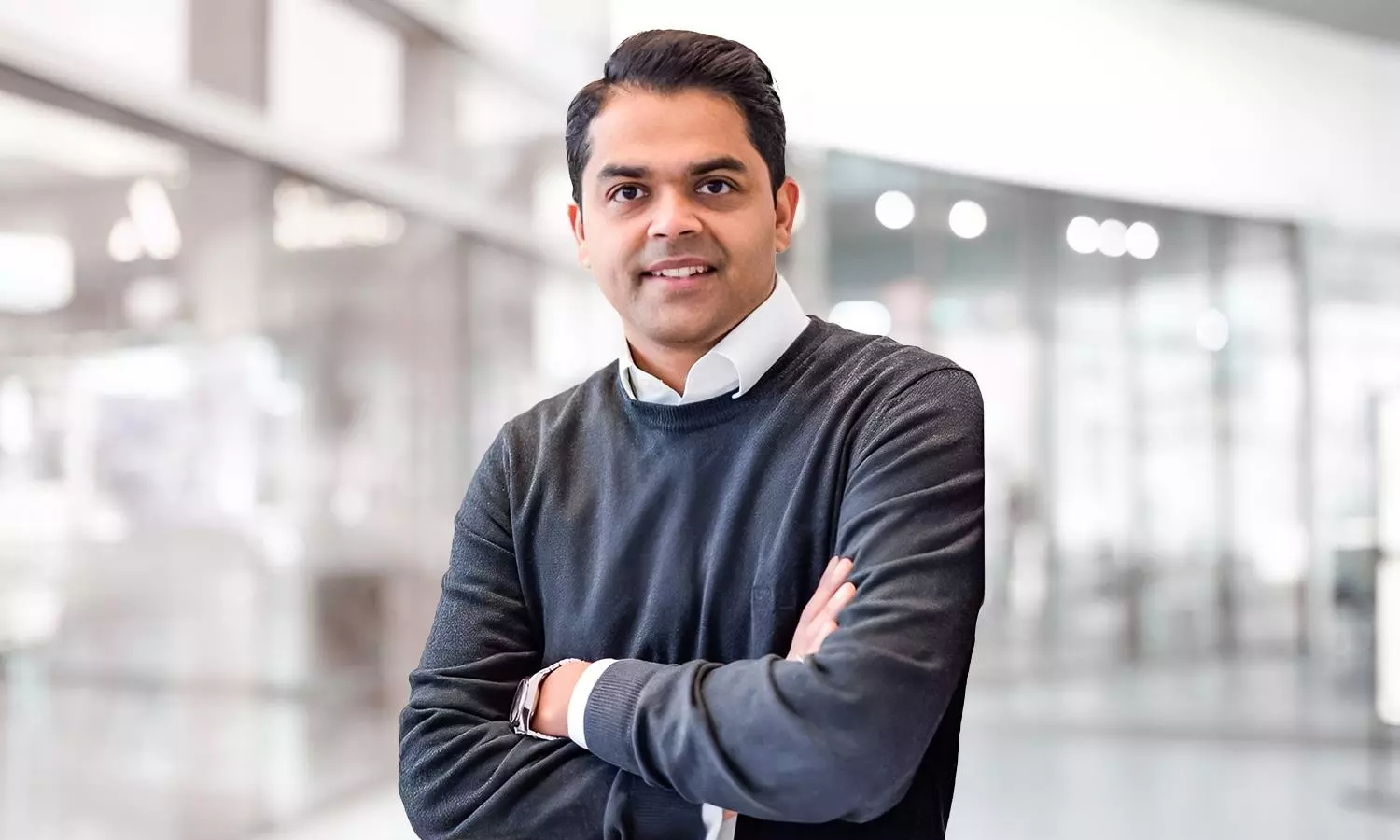How Mercedes-Benz is using AI to manage supply-chain disruptions?
In an exclusive interview, Aritra Ghosh, Vice President of Manufacturing Engineering at Mercedes-Benz Research and Development India, reveals how Mercedes-Benz leverages cutting-edge technologies to enhance production efficiency, optimise supply chains and meet rising demand.

Latest industry reports reveal a surge in India's electric vehicle (EV) market, with electric car and SUV sales up 14% in November 2024, totalling 8,600 units. Mercedes-Benz India remains a key player in the luxury EV segment, selling 97 EVs in November and capturing a 42% share of the luxury EV market. From January to November 2024, the company achieved a 93% year-on-year growth, with 833 units sold, surpassing its 2023 total of 516 units.
In this dynamic market, Mercedes-Benz India is setting new milestones. It recently announced the local production of its EQS SUV 580, a seven-seater EV with a 122 kWh battery and an impressive 809 km range per charge. India will become the only market outside the US to manufacture this luxury SUV, priced at ₹1.4 crore. The move follows the success of the locally produced EQS sedan, which has sold 500 units over the past 18 months.
"At Mercedes-Benz, we are committed to our goal of an electric future."Aritra Ghosh, Vice President of Manufacturing Engineering at Mercedes-Benz Research and Development India
In an exclusive interview with Indian Transport & Logistics News, Aritra Ghosh, Vice President of Manufacturing Engineering at Mercedes-Benz Research and Development India, sheds light on the company's manufacturing strategies and innovations driving this growth. Ghosh discusses how Mercedes-Benz leverages cutting-edge technologies like AI, IoT, and digital twins under its "Digital First" MO360 ecosystem to enhance production efficiency, optimise supply chains, and meet rising demand for EVs.
By integrating EV manufacturing into existing facilities and prioritising workforce upskilling, Mercedes-Benz India is not only advancing electric mobility but also reinforcing its leadership in the luxury EV segment. With luxury EVs making up 2.82% of India's electric car and SUV market in 2024, Mercedes-Benz's proactive strategies position it at the forefront of the industry's transformation.
Could you elaborate on AI's role in streamlining production, optimising workflows, and enhancing decision-making at Mercedes-Benz?"
We at Mercedes-Benz manufacturing, are looking at digitalisation in a holistic manner under our "Digital First" MO360 ecosystem. AI and GenAI-driven applications are key components of this ecosystem. These technologies are helping us to understand and optimise our processes, retrieve relevant information from our archives and control complex applications within the production.
Predictive maintenance tool is one good example in production optimisation by using AI-powered Predictive Analytics for monitoring the health of assets to reduce unplanned downtimes, and improve equipment reliability.
We are further expanding our knowledge to create virtual assistants, adapting AI in digital twins of the production lines which helps to make decisions in real time, developing vision systems for quality control on the production line, to get the data driven actionable insights for strategic decision-making.
As the automotive industry moves towards electric mobility and hybrid vehicles, what key manufacturing changes have Mercedes-Benz implemented to prepare for this shift?
At Mercedes-Benz, we are committed to our goal of an electric future. In manufacturing, it means integrating the new generation of vehicle architectures within the existing facilities and handling a plethora of new components and their manufacturing processes. But this is not just a technical change – a key aspect of this is our people. Mercedes-Benz is running various initiatives to re-skill and up-skill our workforce to prepare them for this shift.
"Strengthening the domestic battery supply chain – Localisation— to streamline logistics and reduce costs."
With the rise of electric vehicles, the automotive supply chain is undergoing significant transformation. From battery sourcing to EV-specific components, how is Mercedes-Benz adjusting its global supply-chain strategy to ensure seamless integration of electric vehicle production?
As Mercedes-Benz transitions to electric vehicles (EVs), this transformation is particularly challenging due to the specialised components required for EVs, including batteries, electric drivetrains, and charging infrastructure.
Securing Battery Materials – Collaborating with Suppliers and securing a sustainable supply.
Collaboration with Suppliers for EV Components - Tier-one suppliers and even some startup partnerships have been formed.
Diversification of Supplier Network - supply chain flexibility across regions.
Strengthening the domestic battery supply chain – Localisation— to streamline logistics and reduce costs.
{Producing electric vehicles and hybrid cars requires a different set of materials, particularly rare earth metals, for the batteries and electric motor components. Mercedes-Benz is focused on securing a sustainable supply of these materials by collaborating with suppliers and exploring alternatives to mitigate any supply risks.}
We recently opened Europe's first battery recycling plant with an integrated mechanical-hydrometallurgical process in Kuppenheim, recovering valuable raw materials like lithium, nickel, and cobalt in pure battery quality.
Aritra Ghosh, VP - Manufacturing Engineering, Mercedes-Benz R&D India, will join Panel 2 at Auto SCM Summit 2024 to discuss technology's impact on automotive supply chains!
Mercedes-Benz has always embraced cutting-edge technology. How are automation, robotics, and artificial intelligence being utilised in your EV manufacturing lines? How do these technologies help optimise production quality, reduce costs, and improve efficiency in EV factories?
The assembly of electric vehicles requires a high degree of precision, particularly in the installation of battery packs, motors, and other key components. Mercedes-Benz has invested in robotics and automation technologies to improve efficiency and reduce human error during assembly.
Mercedes-Benz is leveraging Data Analytics and AI to monitor and optimise production lines, for predictive maintenance among others. Automated Guided Vehicles (AGVs) - transport parts and materials between workstations, using sensors and real-time data to optimise movement and reduce delays in the production process.
We are also implementing automated joining techniques, automated welding robots, automated quality control and inspection, automated testing stations, etc.
With the ongoing trend of 'smart factories' and connected systems, how is Mercedes-Benz leveraging IoT and data analytics in its manufacturing plants? Could you share examples of how these technologies help with real-time monitoring, predictive maintenance, and resource optimisation?
Mercedes-Benz is embracing the industry 4.0 revolution by integrating IoT (Internet of Things) and data analytics into its manufacturing plants to build smart factories. These technologies are transforming operations, improving efficiency, reducing costs, and enhancing overall productivity.
Mercedes-Benz is adopting a range of cutting-edge technologies—ranging from AI-driven inventory management and robotics to blockchain and digital twins—to improve visibility, reduce lead times, and manage supply chain disruptions.
IoT is already being used in various areas at Mercedes-Benz to optimise processes, increase efficiency and enable new services.
Here are some examples:
Production and logistics: IoT devices are used in production to monitor machines, predict maintenance requirements (predictive maintenance) and optimise the supply chain.
Fleet management: IoT makes it possible to efficiently manage fleets of vehicles by monitoring location data, vehicle status and driving behaviour in real-time.
Energy management: IoT devices help to monitor and control energy consumption in production facilities and office buildings to save energy and achieve our sustainability goals.
Cyber security is crucial for IoT devices and systems as they often collect and transmit sensitive data and can be integrated into critical infrastructures.
In the face of increased complexity in manufacturing EVs and hybrids, how is Mercedes-Benz approaching inventory management and warehousing? Are there any new technologies or strategies in place to improve inventory visibility, reduce lead times, and manage supply chain disruptions?
"To handle the complexity, reduce human errors, reduce the delivery bottlenecks, and optimise the space, Mercedes-Benz is adopting automated warehousing solutions such as a cloud-based Warehouse management system."
We, like many other automotive manufacturers, are tackling the complexities of inventory management and warehousing as part of its broader strategy to optimise the production of electric vehicles (EVs) and hybrids. Mercedes-Benz is adopting a range of cutting-edge technologies—ranging from AI-driven inventory management and robotics to blockchain and digital twins—to improve visibility, reduce lead times, and manage supply chain disruptions.
Some of the systems used by Advanced Inventory Management Systems (IMS) leverage AI and machine learning algorithms, which enable predictive analysis, demand forecasting, etc and improve overall efficiency in the supply chain.
Dealer Inventory Management System
Retail Inventory Management - Optimal spare parts availability at the retail level
To handle the complexity, reduce human errors, reduce the delivery bottlenecks, and optimise the space, Mercedes-Benz is adopting automated warehousing solutions such as a cloud-based Warehouse management system. This system provides transparency and cooperation with the intermediary logistics service provider, production controller and plant management.
Mercedes-Benz is actively working to mitigate supply chain disruptions by exploring regionalising its supply chains to reduce the dependency on specific regions or suppliers.
"Our Goal is making our fleet of new vehicles net carbon neutral over the vehicle's entire life cycle by 2039."
The automotive industry has been hit by global supply chain disruptions in recent years. What measures has Mercedes-Benz implemented to ensure resilience in its manufacturing and supply chain, especially with the growing reliance on international suppliers for EV components such as batteries and semiconductors?
Supply chain industry globally got a hit from COVID 19 pandemic, geopolitical dynamics, semiconductor shortage etc which further impacted the production schedules, parts availability, and manufacturing costs.
This issue became further challenging when we are started producing EV and Hybrid vehicles as it faces additional complexity, and sourcing of critical components like batteries and Semiconductors.
Mercedes-Benz is working to overcome these challenges by diversifying and re-thinking its supplier base, by strengthening relationships with strategic local suppliers and by setting up the advanced monitoring systems in place.
Sustainability is a key focus in the automotive industry. How does Mercedes-Benz ensure that its supply chain for electric vehicles is sustainable, particularly when it comes to sourcing raw materials like lithium and cobalt for batteries? What steps are being taken to minimise environmental impact in the supply chain?
"We recently opened Europe's first battery recycling plant with an integrated mechanical-hydrometallurgical process in Kuppenheim, recovering valuable raw materials like lithium, nickel, and cobalt in pure battery quality."
Sustainability is part of Mercedes-Benz business strategy. Our Goal is making our fleet of new vehicles net carbon neutral over the vehicle's entire life cycle by 2039. We plan to cover a significant part of energy needs in our production plants through renewable sources by 2030 and produce green energy on-site.
4 R's of Circularity - Rethink (design development) – Reduce (CO2, water usage, Scrap) – Repair (For long life) – Recycle (materials,
By implementing the 4R's of Circularity we are finding innovative and smart ideas to make our vehicles in a sustainable way.
Aritra Ghosh, VP - Manufacturing Engineering, Mercedes-Benz R&D India, will join Panel 2 at Auto SCM Summit 2024 to discuss technology's impact on automotive supply chains!
Event details: Auto SCM Summit 2024 December 5, 2024 | Sheraton Grand, Pune | Organised by ITLN.

Rajarshi Chatterjee
Rajarshi is an editorial professional with nearly a decade of experience in writing content for print and online publications. He has hosted numerous entrepreneurship events and moderated sessions at various events, including Flower Logistics Africa. He has previously worked with reputable organizations such as YourStory, YouGov, Inc42, and Sportskeeda and has catered to a diverse range of clients, including Google, PhonePe, the Karnataka State Government, and the Rajasthan State Government. In addition to writing, he enjoys watching films, cooking, and exploring offbeat locations in India.


